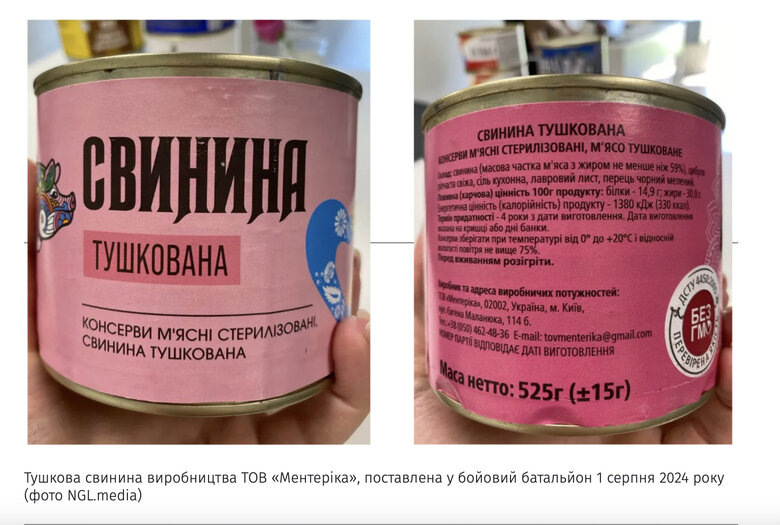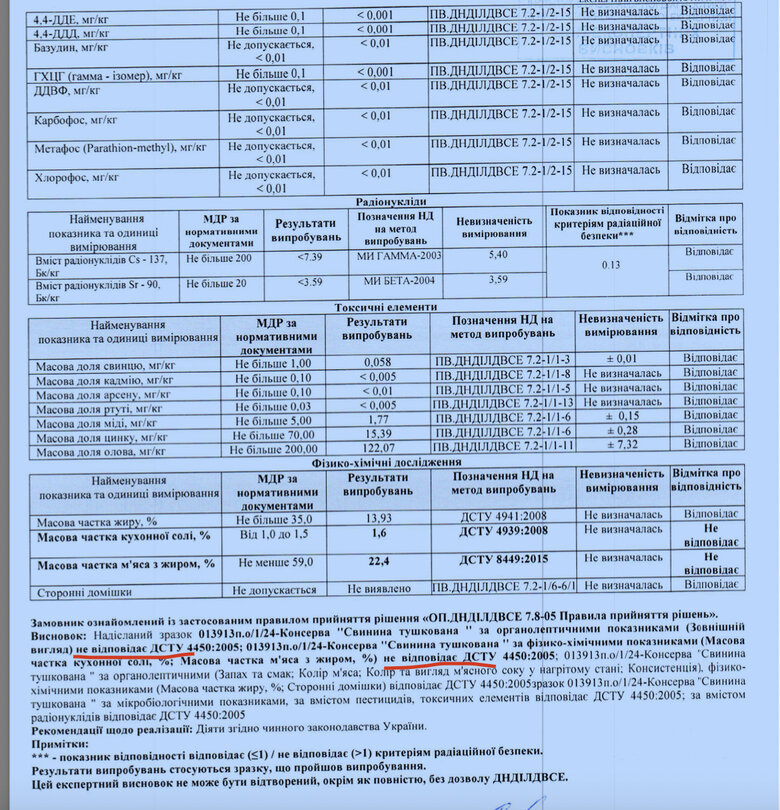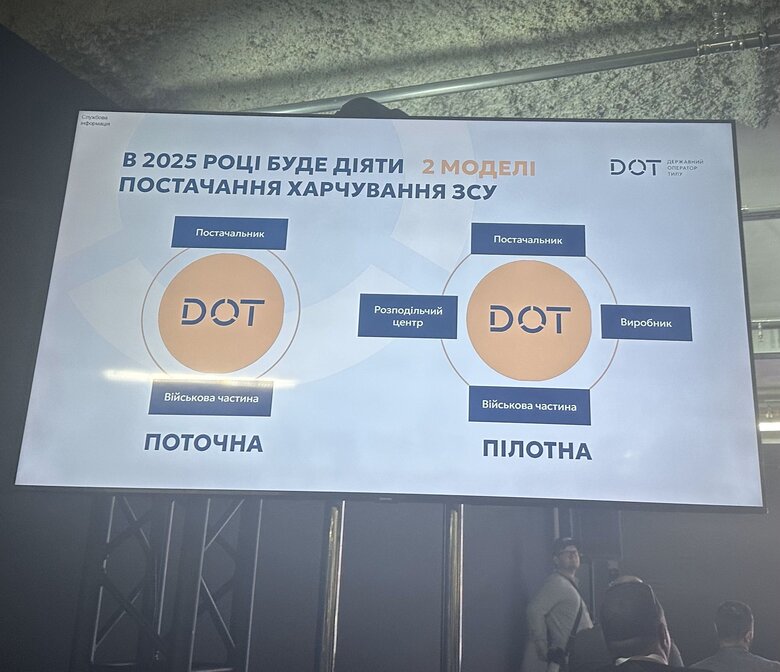Why Ukrainian military eats disgusting meat, how is it connected to catalog and constant suppliers of Ministry of Defense
The Defense Ministry has another scandal with army food. The Lviv-based NGL.media has found that one of the ministry’s laboratories has actually allowed low-quality stew to be supplied to the front.
Unfortunately, this is not the only case, and it makes us once again talk about the main source of this story - the lack of reform of army food, the preservation of catalog procurement, and the fact that the Ministry of Defense has done nothing at all to fulfill the requirements of the anti-corruption strategy to introduce a register of suppliers.
As a result, the "proven" suppliers who have retained their positions in the "market" continue to engage in predatory pricing among themselves in order to win tenders with the lowest price of the DOS (day of supply), and this lowest price is ensured by the low quality of the meat.
The situation has reached the point where factories that have their own meat production facilities simply refuse to put their own label on it because then it is plumped with so much water that no one wants to be responsible for it.
"The average price of chicken in the catalogue is UAH 120. You won't find such chicken anywhere on the market now. As a result, our military receives water in chicken skin," says Censor.NET.
In September, the military sent the author a photo of pork and chicken they received near Pokrovsk, one of the most difficult areas of the frontline.
Our defenders were brought meat that just fell apart in their hands after defrosting and came off with foam.
This area is provided by the company Trade Granite Invest, which is said to be close to businessmen Adamovskyi and Yakubovskyi.
The company was awarded this tender in July after Granpri company failed to supply in this area.
A week after the meat photo was published, a presentation of the DOT's nutrition reform took place, where the author heard a dialog between the head of Trade Granit Yuliia Pavlichenko, head of Trade Granite, and Halyna Litysh, a representative of the State Logistics Operator (DOT), about changing the contractor who transports the meat.
After that, the nutrition of the unit that supplied the meat became much better. But this did not fix the whole picture.
And similar quality problems in the same area were the subject of an investigation by our Lviv colleagues.
In early July, NGL.media was contacted by Dmytro Vlasenko, a command officer in one of the battalions holding the line in the Pokrovsk direction. He told us about the poor quality of the food that his battalion was receiving. He handed over several cans of stew. At first, the journalists tried to eat it but decided it was better not to poison themselves.
Therefore, the editorial board then submitted the stew for examination and found that the laboratory of the military unit A3466 of the Food Safety and Veterinary Medicine Department of the Ministry of Defence of Ukraine had approved the supply of almost 11,000 cans of stewed pork to the AFU, which was unfit for consumption.
The results of the examination showed that the samples of canned food did not comply with the State Standards of Ukraine in terms of organoleptic, physical and chemical parameters. This means that such canned food cannot be sold or consumed.
Experts found that more than 60% of the can's contents were water - more precisely, a thin broth."
Interestingly, most of the canned stewed meat could not be bought in the markets. Instead, Trade Granit buys them from a Kyiv-based company called Menterika LLC, which is essentially just a signboard, not a manufacturer.
Menterika LLC was founded in 2021. About 2 thousand other companies have the phone number of Menterika LLC that was provided during registration. The owner and director of the company is Volodymyr Martynenko.
Menterika LLC sells the goods to Trade Granite through another intermediary company. And everyone claims to have the proper documents. But ...
"Quality control of canned food supplied to the AFU is carried out at the production stage. This means before they are delivered to military units. The Department of Food Safety and Veterinary Medicine takes control samples from the batch, sends them for laboratory analysis and, if the conclusion is positive that they are fit for consumption, issues a quality certificate for the supply of the relevant batch. During August (this is the period referred to in the journalistic material), the DOT did not receive any official complaints from military units regarding the unsatisfactory quality of canned food," the DOT commentary reads.
In order to strengthen control over product quality, the State Logistics Operator, at the request of the Ministry of Defense, plans to digitalize the process of confirming the availability of quality certificates. Namely, to introduce a system solution in the IT system for managing the supply of the AFU - DOT-Chain. It is planned that the supplier will indicate the number of the quality certificates in the invoice in the IT system, which will allow tracking whether the batch really meets the quality requirements or not. But this is still about the future. And the fact that the DOT does not receive complaints does not mean that they do not exist.
In August, former People's Deputy and now military officer Tetiana Chornovol wrote a column saying that there are three worst smells in war: dead bodies, mice, and meat supplied to the AFU.
Unfortunately, this is not the only complaint. This year there are more complaints about the quality of food than last year.
And, unfortunately, members of the public anti-corruption council warned about this a year ago. Because when food procurement was returned to Prozorro, which resulted in savings of almost 4 billion, subcontractors told us: "They're just taking it out on quality. No one will lose their margin, especially since the supplier gets only ¼ of the margin, the rest goes up..."
One of the first signs of such a game was the canned pork that units in the Kyiv region received. Can contained bones and tendons, not meat. But when members of the PACC of MoD (Public Anti-Corruption Council of the Ministry of Defense) received the can's original data, it turned out that the batch had been tested and the quality was good.
Later, the PACC of MoD found out about a method where, after passing the examination, more products were produced under the same numbers, but of much poorer quality.
More than a year has passed since then. The State Logistics Operator was launched and the number of inspections increased. But just yesterday, the author was talking with colleagues from the PACC of MoD and the military about optimizing the work of the MoD hotlines to receive anonymous complaints about food because there are so many of them.
And, unfortunately, this will not be fixed by inspections. That is, they will fix it, perhaps pointwise, but not globally.
Because, as I said at the beginning, there is a global problem with the catalogue. The Ministry of Defence does not buy stew or meat separately. No, it buys an ephemeral DOS - three meals a day for the military. Currently, it costs the state about 110 UAH. In fact, it is impossible to eat properly for that price.
"We eat sausages, which are scary to give to dogs," says one of the soldiers.
In fact, the current 365-item catalogue of military food serves as a smokescreen. It hides a dubious game with prices.
I have already described its basic principles in previous articles.
If you look at the catalogue of Atomservice, for example, you will see that the price of fresh seasonal broccoli has been dropped from 80 to 48 UAH. Fresh cauliflower has been reduced in price from 90 UAH to 54 UAH. Fresh sorrel has been reduced from 180 UAH to 120 UAH. Chilled trout has been reduced in price from 450 to 360 UAH. And, most likely, the supplier will never carry this product.
Instead, first-grade eggs at the 3.1 maximum price of DOT will be supplied for 3 hryvnias. The price of premium eggs has been reduced by 22 kopecks. Long noodles (durum) at the maximum price of 31.5 will be supplied at 30.6. Less than a hryvnia difference. Rigatoni and pasta also lost only a hryvnia, from 22 to 21 hryvnia.
If the supplier has contacts with military units, and the old suppliers certainly do, they will have no problem ordering 300 grams of asparagus. They will supply the product they have and make a margin on it.
But a new supplier who has crossed someone's path is likely to drop out for the same reason. He has no contact with the food executive officer.
During the first food tenders, the DOT tried to change the qualification criteria for manufacturers, hoping for a better supplier than the usual "ACME (A Company that Makes Everything)" that serves the MoD. But instead, the old suppliers rebelled. First, they gave the MoD an ultimatum to return the old qualification criteria, and then they withdrew their bids from ProZorro altogether.
The DOT was forced to approach contractors of the old suppliers to sign contracts with it. Some of them agreed. Among them were two canned food producers. These were the Busk Canning Plant (as a continuation of the Hrynkevych family line) with a long list of complaints about the quality of canned food in previous years, and the Cherkasy Meat Processing Plant (CMPP) LLC.
The latter belongs to the sphere of influence of the former head of the Cherkasy Regional State Administration, Yurii Tkachenko. The assets of Tkachenko's group include the Molly chain of stores and the Farmers' Market in Cherkasy, Zolotonosha Bacon and Zolotonosha Turkey Factory.
In the spring, Cherkasy Meat Processing Plant was able to keep up supplies for only a few weeks. Despite the fact that during the audit, the DOT found the company had full warehouses and only more than 100 employees in one warehouse, the company had constant problems with logistics due to changes in orders and the fact that goods were not accepted from it.
Interlocutors in the DOT said in the spring that the company even recorded a conversation with one of the food executive officers, who said outright that he would not accept the goods.
That was not all - CMPP, like most suppliers, faced the problem in those days when the subcontractors they found refused to supply because the old suppliers bluntly threatened them with not refunding their money if they went to the new ones. Given that the suppliers of certain groups of goods are closely interconnected, such as fruit, a supply collapse for new companies was simply inevitable.
The author knows this story from the subcontractors themselves, who complained that they were not being paid back. This problem is unresolved - many manufacturers have full warehouses but do not want to work with the MoD. Neither do they want to be held hostage to price dumping.
The story of the trunk with 4.7 million euros explained well what happened to the unpaid money.
But this is not the most interesting part of the spring epic. CMPP then replaced Prodreserve under direct contracts. It was next in line. But when the CMPP agreements were still in force, some military units received strange letters that read something like this.
After that, one of the representatives of a large retailer and a consortium of manufacturers entered the supply chain for the DOT.
But after a while, they also stopped supplying food to the army. Some were worn out by the old suppliers in the courts for their warehouses, others decided to leave with minimal losses and prepare better for the next tender. Some doubt whether it is worth it and just want to get money through the courts.
In early September, the DOT presented a new version of the food procurement reform. Some regions will work under the new pilot system. First, informational bidding will be held among producers of 6 groups of goods (including dairy and meat), and then the operator selected by the DOT will sign contracts with them.
Although the new system is much closer to breaking up the catalog that allows price fraud, potential bidders have many questions. Can a manufacturer of one type of product become an operator? I think not. It means either transporting or selling your meat. Which is logical in principle. Although it promises less money.
The main thing here is that the criteria for producers are correct.
But that's not all. Some of the suppliers are not sure that they will be able to enter the new cycle. And here is the biggest problem with the fact that both those who partially supplied and could not hold on and those who became subcontractors still do not receive money.
Most of the old postal operators are now operating on the market - Atomservice, Meat Prom as a new facade of the Hlyniana`s group, Kontrakt Proderezerv, Yug Prod Trade, Busk Canning Plant, which is associated with the Hrynkevych family. The new ones also appear to be connected to them. At least by the transfer of managers.
Whether the new system will be able to change this landscape is unknown. At the very least, most supplies will still be made using a proven system, with a catalog.
Therefore, it is likely that someone will again eat meat from water and stew from cartilage.
Just as nothing has been done to create qualification criteria for signing direct contracts, so too has the imposition or lifting of economic sanctions. If this does not happen, even in the event of criminal proceedings for substandard products, some suppliers will simply change their signboards. The idea was perfected by the Hlyniana`s Group.
Tetiana Nikolaienko, Censor. NET








